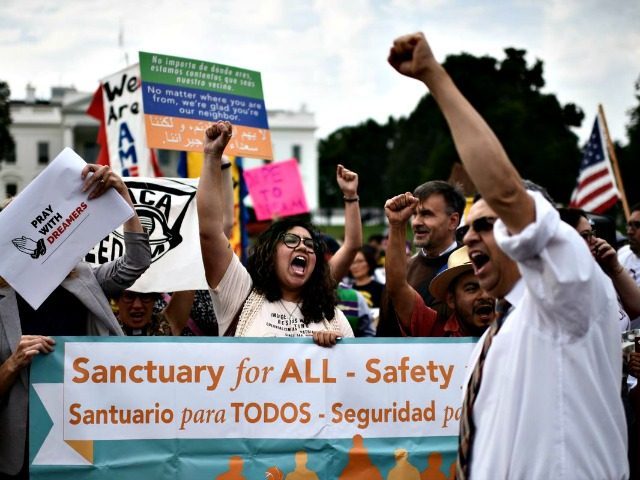A deal in which President Trump accepts an amnesty for millions of illegal aliens enrolled and eligible for President Obama’s Deferred Action for Childhood Arrivals (DACA) program in exchange for minor border wall funding would be counterproductive to the “America First” goals of the administration, depressing U.S. wages in the process ahead of the 2020 election.
As Breitbart News has extensively chronicled, Attorney General Jeff Sessions ended the DACA program last year, although it’s official termination has been held up in court by left-wing judges.
Since then, a coalition of establishment Republicans and Democrats have sought to ram an amnesty for up to 3.5 million DACA-enrolled and eligible illegal aliens through Congress, an initiative supported by the donor class.
Such a plan, most recently, has been touted in an effort to negotiate a deal in which Trump receives anywhere between $1.6 tand $5 billion for his proposed U.S.-Mexico border wall in exchange for approving a DACA amnesty for millions.
The amnesty would render the border wall useless, as it would not only trigger increased illegal immigration at the border — which is already set to hit the highest annual level in a decade next year — but increased legal immigration to the country.
Last year, Department of Homeland Security (DHS) Secretary Kirstjen Nielsen admitted that even discussion of a DACA amnesty increased illegal immigration at the southern border, as migrants surge to the U.S. in hopes of making it into the country to later cash in on the amnesty.
Kansas Secretary of State Kris Kobach previously predicted that a DACA amnesty would trigger an immediate flood of a million illegal aliens arriving at the U.S.-Mexico border. In 2014, when Obama enacted DACA by Executive Order, the temporary amnesty caused a surge at the southern border, as noted by the Migration Policy Institute.
In terms of legal immigration, a DACA amnesty would implement a never-ending flow of foreign relatives to the DACA illegal aliens who can be readily sponsored for green cards through the process known as “chain migration.”
According to Princeton University researchers Stacie Carr and Marta Tienda, the average number of family members brought to the U.S. by newly naturalized Mexican immigrants stands at roughly six. Therefore, should all 1.5 million amnestied illegal aliens bring six relatives each to the U.S., that would constitute a total chain migration of nine million new foreign nationals entering the U.S.
If the number of amnestied illegal aliens who gain a pathway to citizenship under an immigration deal were to rise to the full 3.3 million who would be eligible for DREAM Act amnesty, and if each brought in three to six foreign family members, the chain migration flow could range from 9.9 million to 19.8 million foreign nationals coming to the U.S.
At this rate of chain migration solely from a DACA amnesty, the number of legal immigrants arriving to the U.S. with family relations to the amnestied population would potentially outpace the population of New York City, New York — where more than 8.5 million residents live.
Should the goal of Trump’s proposed border wall be to reduce illegal immigration and eventually incentivize lawmakers to reduce legal immigration levels — where the U.S. imports 1.5 million immigrants every year — to raise the wages of America’s working and middle class, a DACA amnesty would have the opposite impact, increasing illegal and legal immigration levels.
The president has also touted the wall as a benefit to American citizens in terms of cost. A border wall is projected to cost about $25 million, a tiny figure compared to the $116 billion that illegal immigration costs U.S. taxpayers every year.
A DACA amnesty, coupled with a border wall, would have steep costs for American citizens — wiping out the cost-benefit to taxpayers of the wall.
For example, a DACA amnesty would cost American taxpayers about $26 billion, more than the border wall, and that does not include the money taxpayers would have to fork up to subsidize the legal immigrant relatives of DACA illegal aliens. And because amnesties for illegal aliens tend to be larger than initially predicted, the total cost would likely be even higher for taxpayers.
Additionally, about one in five DACA illegal aliens, after an amnesty, would end up on food stamps, while at least one in seven would go on Medicaid, the CBO has estimated.
The number of DACA illegal aliens who will go on Medicaid following an amnesty is likely to be much larger than what the CBO reports.
Previous research by the Center for Immigration Studies indicates that the average immigrant household in the U.S. takes 44 percent more Medicaid money than the average American household. The research also noted that 56 percent of households led by illegal aliens have at least one person on Medicaid.
Another study, reported by Breitbart News, indicates that the CBO estimate of DACA illegal aliens who would end up on Medicaid after an amnesty is the lowest total possible of illegal aliens who would go on the welfare program.
Meanwhile, a DACA amnesty would drag increasing U.S. wages down for the country’s working and middle class, delivering benefits to the business lobby while squashing the intended goals of the Trump administration ahead of the 2020 presidential election. The plan is also likely to hit the black American community the hardest, as they are forced to compete for blue collar jobs against a growing illegal and legal immigrant population from Central America.
On Tuesday, Trump said he would be willing to shut down the federal government in order to secure funding for his proposed border wall. Democrat leaders Sen. Chuck Schumer (D-NY) and Rep. Nancy Pelosi (D-CA) have previously indicated that they would be willing to swap an amnesty in exchange for funding border “security measures.”
John Binder is a reporter for Breitbart News. Follow him on Twitter at @JxhnBinder.

COMMENTS
Please let us know if you're having issues with commenting.